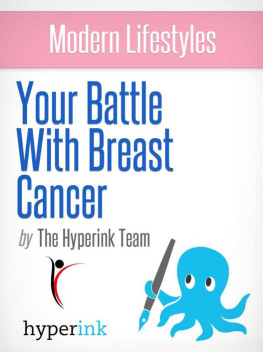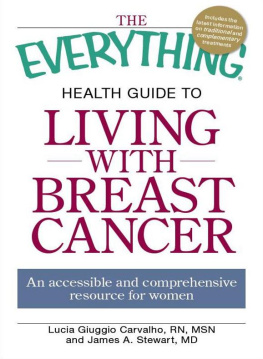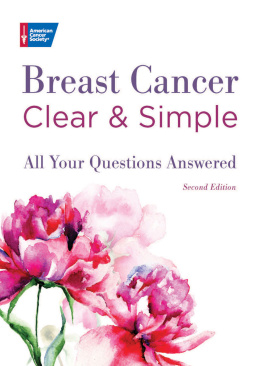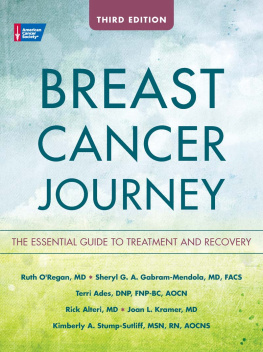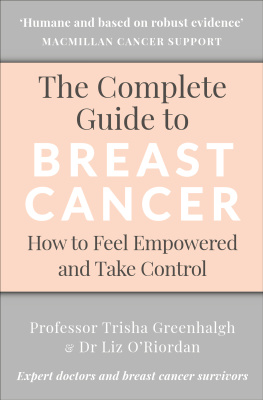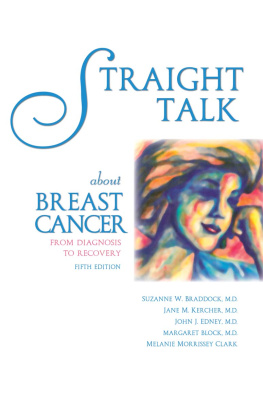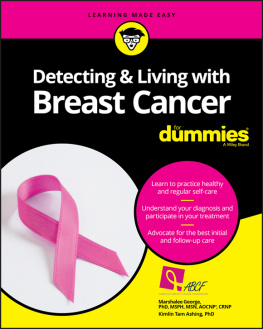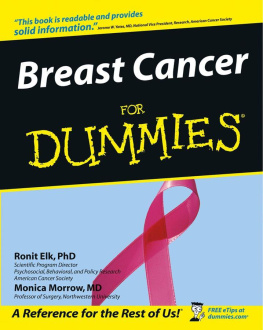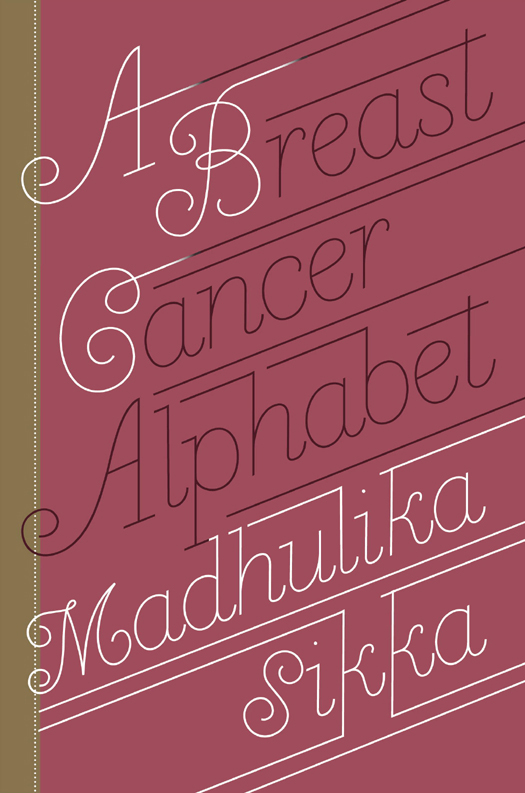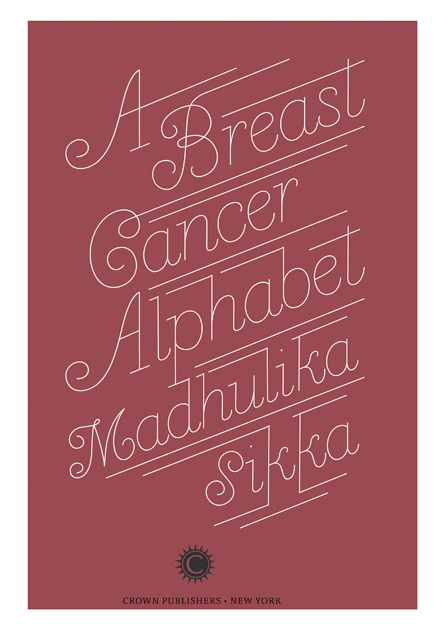Praise for
A BREAST CANCER ALPHABET
A Breast Cancer Alphabet is a brisk, user-friendly ABC of dealing with the disaster of cancer and how to get through it with a smile. It is a remarkably insightful and sensitive guide to making the best of the worst, all delivered with Madhulikas wit and vital energy. Tina Brown, former editor of Vanity Fair , The New Yorker , and the Daily Beast
Madhulika Sikkas A Breast Cancer Alphabet is brilliantly researched, smart, and personalan unvarnished primer of what every woman needs to know about the diagnosis, treatment, and consequences of living with breast cancer. Her practical advice from A to Z is exactly what I wish Id known when I was first diagnosed. With the trained eye and ear of a top-flight journalist, she demystifies the disease, telling you everything you forgot to ask that no one else will share. Reading it will help you recognize, and even laugh, at your worst fears. B is for Brava, Madhulika, for your honesty and creativity in guiding us on a journey none of us chose to take. It is a lot easier when you have A Breast Cancer Alphabet at your side. Andrea Mitchell, NBC News chief foreign affairs correspondent
Breast cancer is a topic no woman wants to learn about firsthand. But should it happen to you, Madhulika Sikkas A Breast Cancer Alphabet is an ideal primer for before, during, and after the experience. Offering the kind of real-world advice that can only come from someone whos lived to tell the tale, Sikkas book is required reading for anyone in search of a book that will bring you up to speed quickly, gently, and with genuine empathy. Micki Myers, author of Its Probably Nothing
Copyright 2014 by Madhulika Sikka
All rights reserved.
Published in the United States by Crown Publishers, an imprint of the Crown Publishing Group, a division of Random House LLC, a Penguin Random House Company, New York.
www.crownpublishing.com
CROWN and the Crown colophon are registered trademarks of Random House LLC.
Library of Congress Cataloging-in-Publication Data Sikka, Madhulika.
A breast cancer alphabet / Madhulika Sikka.First edition.
1. BreastCancerMiscellanea. I. Title.
RC280.B8S4963 2014
616.99449dc23 2013003652
ISBN 978-0-385-34851-5
Ebook ISBN 978-0-385-34852-2
Printed in the United States of America
Hardcover book design by Elizabeth Rendfleisch
Illustrations and cover design by Roberto de Vicq de Cumptich
v3.1
For Sushma
&
Krishan Lall Sikka:
It all begins with Mom and Dad
CONTENTS
INTRODUCTION
There is a hushed reverence in the waiting area outside the Oval Office. After all those years of The West Wing, one might think there would be a bustle of activitya swirl of smart, earnest people walking and talking at the same time. Perhaps I would catch snippets of conversation about budgets and bills, policies and politicians. Its not like that. My NPR colleagues and I were there to interview President Obama, and we waited quietly with a stenographer and the Secret Service. No one else came by.
Despite my years of journalism in Washington, it would be my first time in the Oval Office. It was December 2010, and the White House was beautifully decked out for the holidays. It should have been an exciting moment, but the only thing I could concentrate on was my cell phone. Four days earlier I had undergone a needle biopsy on a suspicious mass in my left breast, found after a routine mammogram. I was waiting for my internist to call with the results. In my heart I knew it would not be good. Something in the radiologists manner gave me a clue. As she prepared for the biopsy, Id tried to break the ice.
Maybe its just a blocked duct, Id said jokingly. She didnt laugh or even crack a smile. Not good, I thought.
This was also the week when Elizabeth Edwards died after having been diagnosed with breast cancer just six years prior. The wife of the onetime presidential and vice presidential candidate John Edwards, she had revealed her diagnosis a day after the 2004 presidential election, in which her husband and his presidential running mate, John Kerry, lost. Her cancer returned in 2007 during her husbands bid for the presidency. She ultimately weathered the twin challenges of breast cancer and her husbands infidelity with grace and poise. I had pored over all the reporting about her in the days since my biopsy. Of course this was part of my job as a journalist, but it took on greater meaning for me as I awaited the results of my biopsy. Thoughts of her passing went through my mind as I paced nervously and made small talk with my colleagues.
On a nearby table, there was a digital photo frame cycling through images of the president. For some reason I kept waiting for the photo of then Russian president Dmitry Medvedev and President Obama at Rays Hell Burger, the renowned hamburger joint in nearby Arlington, Virginia, to come round. Why was I so taken with that picture? Maybe it was because I had eaten there myself with my husband and two daughters, and I remembered how wed laughed at the contrivance in this photo, the presidents of two superpowers, in shirtsleeves, just enjoying a burger like any old Joe. I felt my phone buzz and saw the caller ID was blocked. I didnt answer. This was not a conversation I could have. Not here, not now, waiting to be called into the Oval Office at any moment.
All I remember about my entrance into the Oval Office was that the room seemed much smaller than in the movies. The Christmas tree was also surprisingly understated in its decorations. Was the furniture more shabby chic than stately home? Couldnt tell you. The new rug? No idea. I can tell you that the president looked older than I had imagined. Twenty minutes after we had entered the Oval Office, we were done. Extending the Bush tax cuts, the START treaty, overhauling the tax codethe topics raised in the conversation whizzed by in a blur. The president stepped out to the outer office and donned his coat and scarf before heading off to light the national Christmas tree. We gathered our equipment and headed to the NPR filing booth, a tiny closet located underneath the press briefing room (formerly a swimming pool), to file a quick clip of the interview with the president for the top-of-the-hour newscast. I ducked out of our booth to check my voice mail. One thing to know about the filing area under the press briefing room is that cell reception is quite bad. I had to wander around to find the place where my phone would actually work. Anxious and pessimistic, I listened and breathed a sigh of relief. The call was from my middle school daughters teacher, apprising me of something that had happened at school that day. Normally I might have been concerned about a call from school, but given what I was anticipating, this was welcome and not worrying news.
I returned to the filing booth, where we plotted out what we would be doing for the next news cycle, what clip we could play later in the evening, and the next mornings show. My job as executive producer of Morning Edition, NPRs flagship show, which reaches some 6 million listeners a day, was all about decisionsbig and small. How would we use the presidents interview with host Steve Inskeep throughout the broadcast? Was there a role for our White House correspondent, Scott Horsley? What clip would we put out in advance of the mornings broadcast and release to the press?
I left my colleagues Steve and Scott to structure an outline for our story and wandered back upstairs to the press briefing room. You know this room, the one that has the blue curtains with the White House logo and the press secretarys podium. It is the site of the daily press briefing. Here you get a cell signal. I noticed a fresh voice mail. It was my doctor asking me to have her paged.


